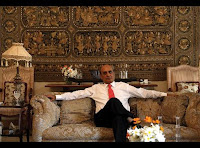 By Yoolim Lee and Naween A. Mangi
By Yoolim Lee and Naween A. Mangi
Dec. 3 (Bloomberg) -- On a September evening when many of Pakistan’s 165 million people were breaking their fast during the Muslim holy month of Ramadan, billionaire Mian Mohammad Mansha, the country’s richest man, was deciding whether to buy an Indonesian bank.
A phone call to his Lahore office interrupted him: Turn on the television, his son Hassan implored. The Marriott Hotel in Islamabad was in flames after terrorists had detonated a truck packed with explosives. The blast, in a security zone less than a kilometer from the presidential residence, killed 53 and injured 266.
“It was terrifying,” says Mansha, 61, chairman of the Nishat Group financial, textile and cement-making empire, who says he stays at the Marriott when he’s in the capital. Just hours before the blast, Asif Ali Zardari, Pakistan’s new president, had vowed to rid the country of the “cancer” of terrorism.
As Pakistan battles extremist-inspired violence and its worst economic crisis in a decade, Mansha says he’s keeping Nishat Group’s expansion on track.
At home, where his MCB Bank Ltd. is the biggest lender by market value, he was in talks in October to buy a rival he declines to name. He’s looking at four banks in Indonesia, the only country with a bigger Muslim population than Pakistan.
By May, he’ll open a machinery and automobile leasing company in Azerbaijan, a predominantly Muslim country between Iran and Russia. He’s eyeing Kazakhstan and the Mideast for banking. And he’s also looking at Canada, with a Pakistani community estimated at more than 300,000 people.
Following India
Mansha started building in the decades of upheaval that followed Pakistan’s split with India after their independence from Britain in 1947.
Now he’s taking a cue from entrepreneurial Indians. Billionaire Mukesh Ambani, chairman of Reliance Industries Ltd., and Ratan Tata, chairman of Tata Group, expanded as India grew at an average annual rate of 8.8 percent in the five years ended on March 31, 2008.
Pakistan almost kept pace with its larger neighbor: Its gross domestic product rose at an average of 7 percent during the five years that ended on Dec. 31, 2007.
“I want to be the first Pakistani, like some of our counterparts in India, to really go out and show that we Pakistanis can even be successful outside Pakistan,” Mansha says two days after the Marriott bombing.
Mansha is optimistic during a dire period for Pakistan.
A phone call to his Lahore office interrupted him: Turn on the television, his son Hassan implored. The Marriott Hotel in Islamabad was in flames after terrorists had detonated a truck packed with explosives. The blast, in a security zone less than a kilometer from the presidential residence, killed 53 and injured 266.
“It was terrifying,” says Mansha, 61, chairman of the Nishat Group financial, textile and cement-making empire, who says he stays at the Marriott when he’s in the capital. Just hours before the blast, Asif Ali Zardari, Pakistan’s new president, had vowed to rid the country of the “cancer” of terrorism.
As Pakistan battles extremist-inspired violence and its worst economic crisis in a decade, Mansha says he’s keeping Nishat Group’s expansion on track.
At home, where his MCB Bank Ltd. is the biggest lender by market value, he was in talks in October to buy a rival he declines to name. He’s looking at four banks in Indonesia, the only country with a bigger Muslim population than Pakistan.
By May, he’ll open a machinery and automobile leasing company in Azerbaijan, a predominantly Muslim country between Iran and Russia. He’s eyeing Kazakhstan and the Mideast for banking. And he’s also looking at Canada, with a Pakistani community estimated at more than 300,000 people.
Following India
Mansha started building in the decades of upheaval that followed Pakistan’s split with India after their independence from Britain in 1947.
Now he’s taking a cue from entrepreneurial Indians. Billionaire Mukesh Ambani, chairman of Reliance Industries Ltd., and Ratan Tata, chairman of Tata Group, expanded as India grew at an average annual rate of 8.8 percent in the five years ended on March 31, 2008.
Pakistan almost kept pace with its larger neighbor: Its gross domestic product rose at an average of 7 percent during the five years that ended on Dec. 31, 2007.
“I want to be the first Pakistani, like some of our counterparts in India, to really go out and show that we Pakistanis can even be successful outside Pakistan,” Mansha says two days after the Marriott bombing.
Mansha is optimistic during a dire period for Pakistan.
For more on this article, please click on the following link: Pakistan’s Richest Man Defies Terrorism to Expand Bank Empire: Bloomberg



1 comment:
http://www.dnaindia.com/report.asp?newsid=1211912
Post a Comment